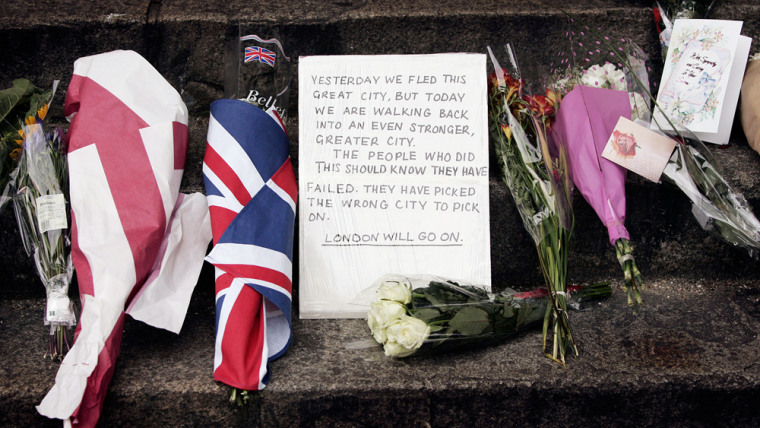The messages were handwritten, heartfelt and poignantly simple: “God bless, from Karen.” “To all the lost loved ones. X from Ronnie.” “Sorry!! Paul.”
Bouquets of fresh flowers and cards scribbled with thoughts for the victims of London’s worst attack since World War II began piling up Friday outside the Underground stations where the terrorists struck.
A mound of floral tributes, many bearing cards with touching sentiments, grew outside the entrance to King’s Cross station, near the site of the worst of Thursday’s subway bombings. Other bouquets were clipped to metal fencing around the subway station.
“All our love. Alice and family,” one read.
“Yesterday we fled this great city, but today we are walking back into an even stronger, greater city,” said another near St. Pancras Church, near where a bomb shredded a double-decker bus.
“The people who did this should know they have failed. They have picked the wrong city to pick on,” it said. “London will go on.”
Searching for loved ones
As victims’ families tended to the injured and mourned the dead, relatives and friends of people who were missing spent another anxious day visiting hospitals and handing out photos, hoping their loved ones would turn up safe and unhurt.
Among them was David Webb, a 38-year-old teacher from southwest London who said his sister, Laura, 29, was last seen by her boyfriend as she left her North End home for work.
He and other family members spent hours going from hospital to hospital trying in vain to track her down.
“We are very upset about her disappearance, and all the options go through your mind,” he said. “They include that she may be being cared for somewhere — or maybe she is still underground.”
Nazmul Hasan, a trainee accountant, was desperate for news of his 20-year-old niece, Shahera Akther Islam. She was on one of the targeted subway lines on her way to her job at a bank and never showed up or returned home.
Calls to her cell phone were answered only by voice mail,” Hasan said. “I am trying to stay as calm as I possibly can, but you only have to see her mother and father to see the pain this has caused.”
At a Holiday Inn in London’s Kensington district, a gracious waiter seemed almost taken aback when a reporter asked where to buy a newspaper. He offered to fetch it himself, then warned: “Are you sure you really want one? It’s not pleasant today.”
He left and returned with a copy of The Independent, staring for a moment at the photo of two people helping an older man out of wreckage.
“It’s just horrible,” he said, shaking his head. “Are you OK?”
Facing down fear
London’s mayor praised the city’s residents Friday for not panicking, and Gemma Nolan and Kelly Vennus typified the widespread stoicism on display in the face of horror.
Nolan, a 24-year-old receptionist, said the city that had to steel itself against years of Irish Republican Army bombings drew from a collective strength of spirit.
“It was very, very calm yesterday. The whole of London was chilled out,” she said. “London’s a very resilient city. It just bounces back from most things.”
Vennus, 27, a teacher from Australia who’s lived in London for three years, said she saw no sense of Londoners losing their nerve.
“I don’t think you can live in fear because you haven’t got a lot, personally, as an individual, a lot of control over what happens,” she said. “So you’ve just got to live your life. And if you walk around in fear, that’s what they want, don’t they? They’re trying to terrorize us, and they’re winning if we stop doing what we want to do.”
Acting on instinct
Newspapers hailed him as a hero, but former firefighter Paul Dadge insisted he was just acting on instinct when he gave first-aid to about half a dozen victims of the bombing between the King’s Cross and Russell Square stations.
Photos of Dadge, 28, who now works for a telecommunications company, appeared Friday in many of London’s dailies, showing him helping a burn victim.
Dadge said he was traveling by subway when his train suddenly stopped. He and other passengers exited the station, and when he surfaced, Dadge saw bloodied victims.
“I was trained in first-aid when I was in the fire service, but to be honest, I think it was instinct more than training that took over,” he said. “I always seem to be in the wrong place at the right time.
Flood of condolences
Books of condolence were set up around the world, but one had a special resonance for Britons — the book in Belfast, Northern Ireland, rocked over the decades by sectarian violence.
“We faced 30 years of terrorist attacks across Northern Ireland with thousands of people losing their lives,” Mayor Wallace Browne said.
“We therefore can empathize with the plight that the citizens of London now face,” he said. “The greatest lesson learned was that despite sustained efforts from those wishing to inflict optimum mayhem, we must never falter.”
Among the first to sign the book at Belfast’s City Hall was David Blunkett, a former British home secretary.
“There is a certain poignancy to signing the book of condolence here in Belfast which has suffered so much through violence,” he said.
